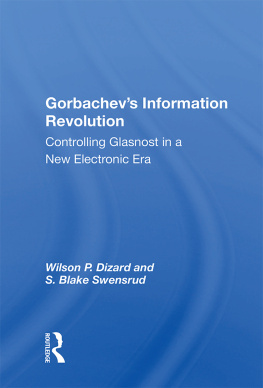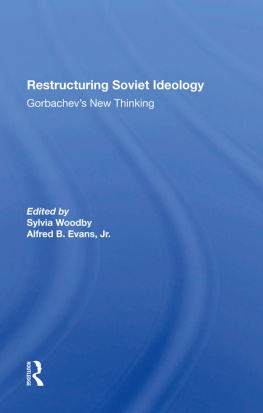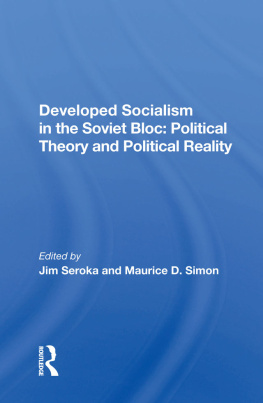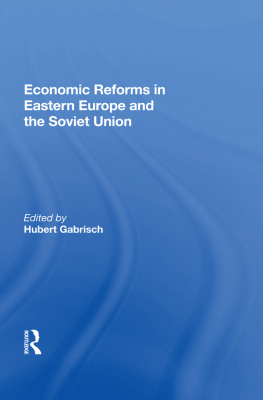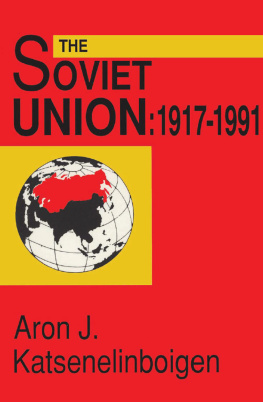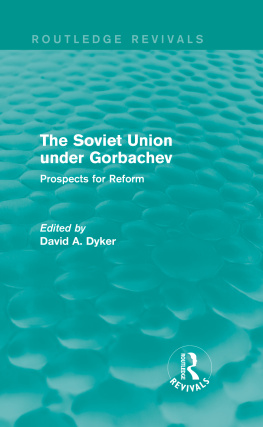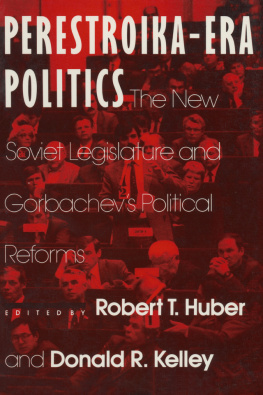Can Gorbachev Change the Soviet Union?
Published in cooperation with the Austrian Institute for International Affairs
First published 1990 by Westview Press
Published 2018 by Routledge
52 Vanderbilt Avenue, New York, NY 10017
2 Park Square, Milton Park, Abingdon, Oxon OX14 4RN
Routledge is an imprint of the Taylor & Francis Group, an informa business
Copyright 1990 by Taylor & Francis
All rights reserved. No part of this book may be reprinted or reproduced or utilised in any form or by any electronic, mechanical, or other means, now known or hereafter invented, including photocopying and recording, or in any information storage or retrieval system, without permission in writing from the publishers.
Notice:
Product or corporate names may be trademarks or registered trademarks, and are used only for identification and explanation without intent to infringe.
Library of Congress Cataloging in Publication Data
Mlyn, Zdenk.
Can Gorbachev change the Soviet Union? : the international
dimensions of political reform / Zdenk Mlyn ; translated by
Marian Sling and Ruth Tosek.
p. cm.
Translated from the German.
ISBN 0-8133-0934-4
1. Soviet UnionPolitics and government1985
2. Soviet UnionForeign relations1985 . I. Title.
DK288.M59 1990
327.47dc20
89-70637
CIP
ISBN 13: 978-0-367-00360-9 (hbk)
This book was conceived and written at the time of the Nineteenth All-Union Conference of the Communist Party of the Soviet Union in the summer of 1988. The manuscript was finalized in the spring of 1989. The English edition comes out a full year latera year that was marked by stormy developments in the Soviet Union and in the entire Soviet bloc and brought some far-reaching and important systemic changes. It is therefore impossible to update the text through additions and corrections.
The original main purpose of the study was to analyze the specifically Soviet historical and ideological conditions for a change of the system that could take place without dangerous disruptions. I intended to describe an optimal and realistic program for systemic change and at the same time to point out the limitations of any change that is mainly imposed from above.
At the time it was still correct to argue that Gorbachevs principal problem consisted in mobilizing sufficient popular pressure against the bureaucratic system. But during the year 1989 this pressure from below manifested itself in extreme forms of mass unrest, such as strikes, mass demonstrations, and in some cases nationalistic conflicts marked by violence and pogroms. In the smaller East European countries we witnessed an extraordinarily rapid disintegration of the Soviet-type system. It is therefore no longer possible today to speak about the existence of a bloc as I do it in in the section on the impact of reform on the Soviet bloc.
Some tendencies and conflicts that had already been noticeable earlier and that are described in this study have, at the beginning of 1990, not only acquired great momentum but also become so interrelated that they form a veritable Gordian knot. The fate of Gorbachevs reform politics will depend on whether it will be possible to unravel this knot, gradually, without disruptions, and through compromise. In the area of politics, the nationalist problem has become much more serious and important than I have described it. In my study I did not make it a separate object of analysis but dealt with it only in the context of the representation of interests.
In spite of all these limitations, I believe that the study might help the reader to understand the developments in the Soviet Union. Some parts of the study might be overtaken by events, but the book as a whole represents a valid in-depth analysis of the Soviet system and a description of possible scenarios for future developments that are only applicable to the Soviet Union and cannot be measured by Western standards. This applies to the history predating Gorbachevs reform efforts as well as to the specific developments of institutional structures, such as the rule of law in the Soviet system. I also believe that the analysis of the role of the Communist party remains valid, in spite of tendencies toward the formation of other parties.
If it should turn out that the pace of change will increase further, bringing more democracy earlier to the Soviet Union than I anticipated in my cautious analysis, I will still be happier than in the opposite case.
Zdenek Mlynar
In 1985 Gorbachev assumed the highest political post in the Soviet Union. Since then, a host of books has been written on the subject, together with a vast number of articles, studies, and commentaries on what his new policy means and what it does not mean, on what it can or cannot change in the USSR as well as in the rest of the world. There is no need today to put forward specific arguments supporting the contention that Gorbachevs policy is a genuine endeavor for change. Only an insignificant minority of analysts would claim that this policy is nothing but a tactical maneuver to conceal an unchanging reality. Gorbachev is serious about his policy of perestroika (restructuring)on this there is increasing agreement even in the West. Yet the question as to what its content will be remains open.
There can be no doubt that Gorbachev and his group within the leadership of the Communist Party of the Soviet Union (CPSU) really intend to change existing conditions both in domestic policy and in the sphere of international relations. But there is no straightforward reply to questions regarding the direction and extent of this changenor to the question of whether Gorbachev will be able to achieve all he hopes to achieve. He is limited by an entire spectrum of conditions, only some of which are obvious; others remain more or less concealed, and their significance is not always quite clear.
In this study I want to focus attention precisely on this spectrum of conditions. My intention is to outline the possibilities for qualitative changes in the Soviet system and the limits to reforms, at least for the foreseeable future. I also want to focus attention on problems that cannot be judged according to ideas current in the West, because in the USSR the same concepts may have, and in fact often do have, a different meaning. I believe that it is important, when discussing these ideas, to point to at least the main historical factors that can determine the prospects for radical reforms in the existing economic, social, and political system. In my opinion, these are not confined to factors originating mainly in the years of Stalins totalitarian dictatorship; a number are also linked with the history of Russia, whose cultural and political traditions differ from those that have shaped developments in the West.
Unless these and similar matters are taken into account, it is not possible to answer the question of whether Gorbachev has even a chance of changing the Soviet system successfully or whether he will meet the same fate as Khrushchev or the reform communists of Poland, Hungary, or Czechoslovakia. Moreover, it is in these fundamental aspects of Soviet reality that we can see how far Soviet society and its political leadership has proven successful or not in coming to terms with the pastwith the assessment of their own history. Only in this context is it possible to attempt an analysis of the relationships among the economy, politics, and ideology in the course of the reforms now under way.



